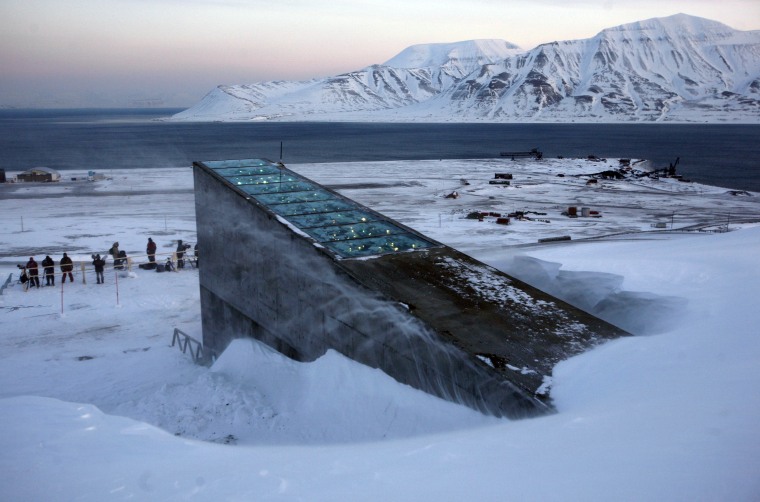Syria's civil war has forced scientists to request the first-ever withdrawal of seeds from a Doomsday vault built in the Arctic to safeguard the world’s food supplies, officials said Friday.
Experts working to conserve and grow cereals with strong resistance to drought and warmer global temperatures can no longer rely on their facility in the war-torn country's city of Aleppo because it has been occupied by armed factions.
The International Center for Agricultural Research in the Dry Areas (ICARDA) said it has made a request to take back some of its samples from the Svalbard Global Seed Vault. The vault was created by the Norwegian government in 2008 to protect vital crops such as wheat against global disasters, war or disease.
It will be the first time seeds have been withdrawn from the facility, which lies more than 800 miles inside Arctic Circle — midway between Norway and the North Pole — and is the largest vault of its kind in the world. Built into the mountainside on the Svalbard archipelago, it relies on permafrost and thick rock to ensure that the seed samples will remain frozen even without power.
“We hoped that we would never get such a request,” said Asmund Asdal, who runs the vault on behalf of the Nordic Genetic Resources Center. “Ideally, all the world’s seed gene banks would function normally but of course we are prepared for this.
“We are of course very sad and frustrated at the situation in Aleppo but at the same time it shows that having a backup facility is important and it works.”

ICARDA has requested approximately 16,500 of its seed samples — one seventh of the total it has stored in Svalbard — and hopes to reproduce them at its other facilities in Morocco and the American University in Beirut, Lebanon. Eventually it will send new samples back to Norway.
“These seeds are very valuable to the world,” ICARDA’s Director-General Mahmoud Solh told NBC News. “It is an important source for breeding programs, particularly for crops that have drought immunity or are resistant to the hotter temperatures we are getting because of global warming.”
He said some scientists were still present at the Aleppo facility but that its one-time headquarters had been occupied by armed groups.
“Fortunately it is not ISIS, they are some fundamentalist groups,” he said. “They seem to co-exist. They are using the land for their own benefit, for example to grow legumes, but we have no control of it.
“It is a very difficult situation,” he added. “I can’t tell you what will happen tomorrow, God only knows.”
The Svalbard seed bank has exactly 865,871 samples from every country in the world, Asdal said.
“In fact, we have seeds from more countries than now exist,” he explained, since some of the older seeds are from now-defunct nations such as Czechoslovakia.
Syria's civil war has killed a quarter of a million people since 2011, according to United Nations estimates, and driven 11 million more from their homes.
